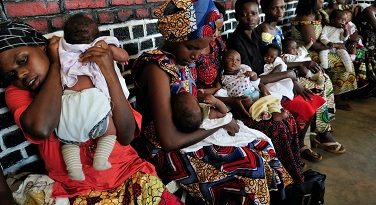Death Toll Rises Above 300 In Sierra Leone Mudslide


The Oasis Reporters
August 14, 2017

People were wading through streets waist-deep in muddy water
The English speaking West African nation of Sierra Leone has seen it’s fair share of disasters. There was a crippling civil war of the government and people versus foreign backed rebels led by Foday Sankoh where many several citizens were amputated to the Ebola virus that decimated huge numbers of people.
Nigerians and other West Africans came out to help.
This time, it is a massive mudslide, with death toll from the massive flooding in the outskirts of Freetown climbing up to “at least 312”, Patrick Massaquoi, a spokesman for the local Red Cross, told AFP.
Massaquoi warned that the toll could rise further as his team continued to survey disaster areas in and around the capital city, where heavy rains have caused homes to disappear under water and triggered a mudslide.
Earlier, Sierra Leone’s vice-president, Victor Foh, said it was “likely that hundreds are lying dead underneath the rubble,” adding that a number of illegal buildings had been erected in the area.
“The disaster is so serious that I myself feel broken,” Foh said. “We’re trying to cordon (off) the area (and) evacuate the people.”
An AFP journalist at the scene saw bodies being carried away and houses submerged in two areas of the city, where roads turned into churning rivers of mud and corpses were washed up on the streets.
Mohamed Sinneh, a morgue technician at Freetown’s Connaught Hospital, said 180 bodies had been received so far at his facility alone, many of them children, leaving no space to lay what he described as the “overwhelming number of dead”.
Many more bodies were taken to private morgues, Sinneh said.
‘We have lost everything’.
Sierra Leone’s national television broadcaster interrupted its regular programming to show footage of desperate people trying to retrieve their loved ones’ bodies.
People cried as they looked at the damage under torrential rain, gesturing toward a muddy hillside where dozens of houses used to stand, a witness said.
Fatmata Sesay, who lives on the hilltop area of Juba, said she, her three children and husband were awoken at 4:30 am by rain beating down on the mud house they occupy, which was by then submerged by water.
She managed to escape by climbing onto the roof.
“We have lost everything and we do not have a place to sleep,” she told AFP.
Meanwhile disaster management official Candy Rogers said that “over 2,000 people are homeless,” hinting at the huge humanitarian effort that will be required to deal with the fallout of the flooding in one of Africa’s poorest nations.
Military personnel have been deployed to help in the rescue operation, officials said.
Freetown, an overcrowded coastal city of 1.2 million, is hit each year by flooding during several months of rain that destroys makeshift settlements and raises the risk of waterborne diseases such as cholera.
Many of Freetown’s poorest areas are close to sea level and have inadequate drainage systems, exacerbating flooding during the wet season.
People may have been asleep when the mudslide occurred
A hillside in the Regent area collapsed early on Monday following heavy rains, leaving many houses covered in mud.
A BBC reporter at the scene says many people may have been asleep when the mudslide occurred.
A spokesman for the Red Cross, Abubakarr Tarawallie, told the BBC that 179 bodies had been taken to the central morgue in Freetown.
Mr Tarawallie said the organisation’s volunteers and staff were involved in search and rescue operations and that people affected were in immediate need of shelter and blankets.
He added that at least 100 properties had been submerged and that some had collapsed after a section of Sugar Loaf mountain came down at around 06:00 GMT.
A Sierra Leonean disaster management official, Candy Rogers, said that “over 2,000 people are homeless” as a result of the mudslide in the Regent area, AFP reports.
Mr Rogers said that a huge humanitarian effort will be required to deal with the aftermath of the flooding.
Umaru Fofana of the BBC Africa service said “People are wailing uncontrollably; one woman told me she had lost more than 11 members of her family in the disaster, while another man said he had lost his wife, mother-in-law and children.
Hundreds of people are still coming to the area to look for their loved ones. Some of them told me they have not been able to find them.
In fact, there is no sign of the dozens of homes that were built at the foot of Sugar Loaf mountain.
They are covered in mud, with large areas of mire in some parts. It looks strong, but it is flaky. The concern is that if people walk there they risk sinking in the mud”.
— Francis Reffell (@francisreffell) tweeted August 14, 2017 that
“Increasingly frequent deluges disproportionately affect those living in informal settlements” #Freetown #floods https://t.co/vVgG9I8ocX pic.twitter.com/QvGUxrkcYy
— Jamie Hitchen (@jchitchen) August 14, 2017 tweeted also that
“Flooding is not unusual in Sierra Leone, where unsafe housing in makeshift settlements can be swept away by heavy rains.
The rains often hit areas in and around Freetown, an overcrowded coastal city of more than one million people.
In 2015, Freetown endured deadly floods sparked by monsoon rains that killed 10 people and left thousands more homeless”.
Proactive government help involving the people and international organizations may need to save Sierra Leone from it’s many disasters, natural and man made.
With FRANCE 24, REUTERS, AFP, AP, BBC













